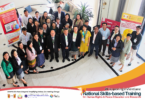✨ Empowered Embroidery: Preserving Culture and Empowering Akha Women
Featuring Ms. Ye Phonevilay Soukhy | Grantee, RGP 2024
Researcher, China Exploration and Research Society (CERS)
Mentor: Dr. Boualaphiane Sisouk, National University of Laos

The “Empowered Embroidery” project, led by Ye Phonevilay Soukhy, focuses on preserving the traditional embroidery of the Akha people while providing economic opportunities for young Akha women. The project aims to revitalize embroidery skills that are part of the Akha cultural heritage, creating a sustainable framework for these traditions to thrive in the modern world. Soukhy’s approach is rooted in the Sustainable Livelihoods Framework (SLF) and uses a mixed-methods research design. Through this work, she seeks to support the community by offering opportunities for young women to not only learn traditional skills but also gain economic independence.
In the highlands of Lao PDR, embroidery has long been a way for Akha women to express cultural identity and creativity. Now, a research project titled “Empowered Embroidery: Reinvigorating Akha Culture and Empowering Young Women through Economic Opportunities” is beginning to explore how this traditional craft could also support social and economic empowerment.
Supported by the SHAPE-SEA Regional Grant Program, the study is in its early stages but already revealing valuable insights. Through fieldwork and conversations with local women, the researcher is documenting how embroidery is more than an art form—it is a pathway for young Akha women to access income-generating opportunities while staying rooted in their cultural heritage.
Initial findings suggest that when embroidery is linked with local enterprise and community workshops, it can help young women build confidence, develop leadership skills, and contribute economically to their families. The process also fosters spaces for intergenerational learning, where elders share traditional designs and stories, strengthening cultural continuity.

For Soukhy, this project has been a valuable learning experience. It has helped her develop essential research skills, particularly in data collection and analysis, while also deepening her understanding of Akha culture. Managing the project has shown her that human rights research and development work is not just about economics but also about preserving heritage and creating opportunities for individuals to succeed in ways that respect their identity, ensuring that cultural traditions remain an important part of Lao society and its future.
As the research continues, it hopes to contribute to broader discussions on indigenous women’s roles in development and the value of culture-based economic activities. While much remains to be explored, early signs point to embroidery not only as a livelihood activity, but as a quiet yet powerful thread connecting identity, agency, and opportunity.

“The RGP 2024 provides an opportunity to stay engaged with the latest developments in the field of research and opens doors to new professional networks. It allows for collaboration with other experts and institutions, which can help develop leadership and mentorship skills. The study, Empowered Embroidery: Reinvigorating Akha Culture and Empowering Young Women through Economic Opportunities, is especially beneficial for Lao PDR,” shared her mentor, Dr. Boualaphiane Sisouk, from the National University of Laos.

#RGP2024 #SHAPESEA #LaoPDR #HumanRights #Peace #Research #Opportunity #CivilSociety #ASEAN #SEA #SoutheastAsia #PeaceBuilding #AacademicEnquiry #EmergingVoices #EmergingScholars #CSO #StoriesOfChange #ResearchGrants #CSO #EmergingScholars





